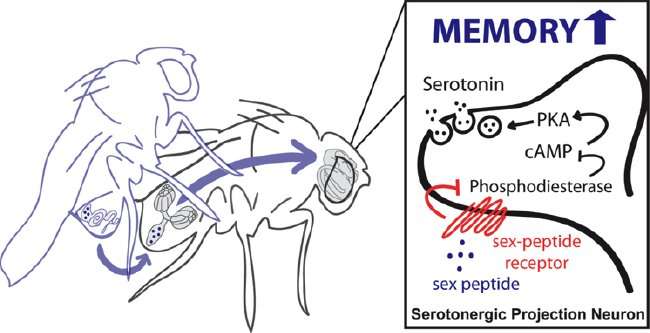Mating identified as a key factor for long-term memory performance in drosophila

French researchers from the Brain Plasticity Unit (ESPCI Paris, PSL University, CNRS) have just found that mating strongly enhance memory ability of Drosophila females. Surprisingly, a peptide in the male sperm can reach the females' brain and specifically activate the neural circuit controlling the creation of long-term memory. This mechanism could allow virgin females to have a more audacious exploratory behavior, thus ignoring danger signals. The work is published in Science Advances.
Can mating have a permanent impact on cognitive functions such as learning and memory?
French researchers have just discovered that aversive memory performances increase after mating in Drosophila females. They also highlight the key role of a protein from the male sperm called " sex peptide ".
Reproduction can affect the behavior of mammalian or insect females, for example during food intake. However the impact on cognitive functions remains poorly studied. Scientists have focused their attention on aversive long-time memory in drosophilae, which is generated by pairing an odor with small electric shocks. Then, researchers compared the memory performances of virgin females and after-mating ones. They noticed that memory performances strongly increase for fecundated flies.
The team also identified the key element involved in the process: a peptide of the male sperm, called sex peptide, already known for its role in laying control. The study actually shows that the sex-peptide specifically activates a pair of neurons in the brain secreting serotonin. This activation then leads to the creation of long-term memory.
The scientists are now wondering why such a spectacular effect occurred. A hypothesis is that the lack of aversive long-term memory allows virgin females to embrace a more audacious exploratory behavior, increasing the chances to meet a partner. Such a risk taking has been witnessed in young mouse. Moreover, preventing the creation of long-term memory could also represent a useful economy of energy for young adults.
More information:
phys.org/news/2019-11-peptide- … it-semen-memory.html
Provided by ESPCI Paris